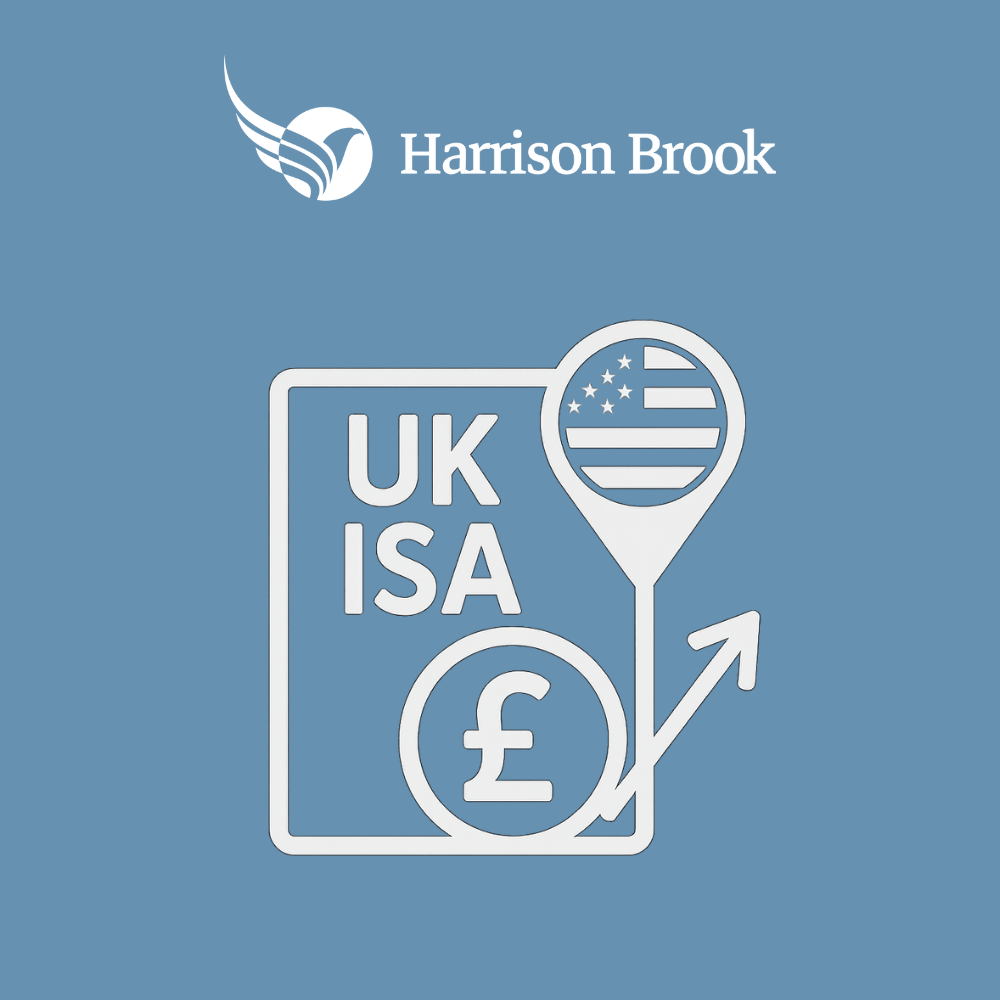
For many British residents, Individual Savings Accounts (ISAs) are a familiar way to save and invest. Tax-free in the UK and regulated by the UK government, which sets the rules and tax advantages for ISAs, they are simple to manage and flexible across different investment types. They are often the first port of call for building wealth.
But what happens if you move abroad, particularly to the United States? Traditionally, the advice was straightforward: you could not contribute once you became a non uk resident, and worse, the IRS did not recognise the tax-free wrapper. This created a headache for many expats.
Today, however, there are new solutions. It is now possible to transfer your existing UK ISA to an isa provider who accepts US residents and then buy US-compliant investments within that ISA structure. For the first time, British expats in America can hold on to the benefits of their ISA without falling foul of US tax rules.
What is a UK Individual Savings Account (ISA)?
A UK Individual Savings Account is a tax-free wrapper with tax free status, allowing residents to save or invest up to an annual isa allowance without paying UK income tax or capital gains tax on the returns. Options include:
- Cash ISA – tax free savings accounts sheltered from tax
- Stocks and Shares ISA – investments in equities, bonds, and funds
- Lifetime ISA – designed for first-time buyers or retirement savings
- Innovative Finance ISA – peer-to-peer lending
For UK taxpayers, these accounts offer tax benefits and are simple, tax-efficient, and flexible. For expats in the USA, however, the situation is more complex.
Can I Have a UK ISA if I Live in the USA?
Yes, you can keep your ISA when you move abroad, but only a UK resident can open or contribute to a new ISA. Once you are no longer a UK resident, you cannot usually make new contributions.
But now, with specialist providers, US expats and American expats can transfer your ISA into a structure that accommodates US residency.
This means:
- You can keep your ISA open even as a US tax resident.
- You can restructure the investments inside to be US-compliant.
- You avoid many of the historic problems with PFICs (Passive Foreign Investment Companies).
So, while you cannot open a new ISA as an American resident, you can now transfer an existing one and continue managing it efficiently. The answer depends on your individual circumstances, such as your residency status, tax situation, and provider policies.
How is a UK ISA and Capital Gains Tax Treated in the USA?
Here lies the main challenge. The IRS does not recognise ISAs as tax-free. From a US perspective, a UK ISA is taxable in the US, considered fully taxable, and does not receive any special tax treatment from the IRS. Gains, dividends, and interest are all reportable and taxable.
Key considerations include:
- US Tax on Growth – any capital growth inside the ISA is taxable in the US, and the tax free growth available in the UK is not recognized from the US perspective.
- Dividends and Interest – all income must be reported annually.
- PFIC Risk – UK-domiciled funds inside an ISA can trigger punitive US tax treatment.
US expats should be aware of the tax consequences and potential tax burden associated with holding UK ISAs, as US tax laws often negate the UK tax advantages.
This is why transferring your ISA to a provider who offers US-compliant investments is such a significant development. It allows you to maintain the ISA structure while removing the IRS headaches. All income and gains must still be reported on your US tax return, as the IRS treat these accounts as standard taxable accounts without any special tax treatment.
Do I Have to Pay UK Taxes if I Live in the USA?
The short answer is no. Once you become non-resident in the UK, you no longer pay UK tax on ISA income or gains. However, you must meet reporting requirements in the USA. US citizens and green card holders are required to report worldwide income, including income from foreign accounts and foreign financial accounts such as UK ISAs, on their US tax returns. The US tax system is based on worldwide income, so returns from ISAs must be reported regardless of where you reside.
Thanks to the US–UK tax treaty, you generally avoid double taxation, but careful structuring is still essential. For expats, the issue is rarely UK tax but almost always how the IRS treats their overseas accounts.
Is There an Equivalent of an ISA in the USA?
The United States does not have a direct equivalent of the UK ISA. In particular, a UK ISA is not considered a ‘retirement account’ or included among ‘retirement accounts’ in the US context. Instead, Americans use structures such as:
- Roth IRA – tax-free withdrawals in retirement if conditions are met
- 401(k) – employer-sponsored retirement savings plans, both of which are classified as retirement accounts
- Brokerage Accounts – standard taxable investment accounts in the US, offering flexibility for investments
By transferring your UK ISA to a provider that allows US residency, you can now create a parallel solution that works alongside these American accounts.
What Happens to My ISA if I Leave the UK?
- You cannot contribute further unless you return to UK residency.
- You can transfer it to a compliant provider if you move to the USA.
- The funds remain yours and can be invested in ways that suit your new tax residency.
This ensures continuity and protects your long-term savings. Maintaining your ISA can also be an important part of your long term plans for financial security.
PFIC Rules and Their Impact on UK ISAs
For US residents holding UK ISAs, especially Stocks and Shares ISAs, understanding PFIC (Passive Foreign Investment Company) rules is crucial. Under US tax law, most UK mutual funds and investment trusts inside a shares ISA are classified as passive foreign investment companies. This classification brings a host of complex tax rules and reporting requirements that can significantly increase your tax liability.
The PFIC rules are designed to prevent US taxpayers from deferring tax on passive income earned through foreign investment accounts. If your ISA contains UK mutual funds or similar investments, you’ll likely need to file Form 8621 for each PFIC every tax year. This form is notoriously complex and can add to your compliance costs.
Worse, the PFIC regime imposes a punitive tax treatment: you may be taxed at the highest marginal rate on gains, and interest charges can apply to any deferred tax. Even if you don’t receive distributions from your ISA, the IRS may still tax you on a deemed distribution basis, meaning you could owe US tax on income you haven’t actually received. This can lead to double taxation, as the same income might also be subject to UK tax.
Given these challenges, it’s essential for US residents with UK ISAs to seek specialist tax advice. By restructuring your ISA investments into US-compliant assets, you can avoid the pitfalls of PFIC rules and make more tax-efficient investment decisions. Understanding the impact of passive foreign investment company regulations is key to managing your shares ISA or stocks and shares ISA as a US resident.
Foreign Trust Reporting Requirements for US Residents
In addition to PFIC rules, US residents with UK ISAs may face foreign trust reporting requirements. The IRS may treat certain UK ISAs as foreign trusts, especially if the account structure or provider meets specific criteria under US tax law. If your ISA is considered a foreign trust, you are required to file Form 3520 to report any transactions, such as contributions, distributions, or gifts involving the trust, during the tax year.
Form 3520 demands detailed information about the foreign trust, its beneficiaries, and all relevant transactions. Failing to file this form can result in substantial penalties—up to $10,000 per unreported transaction. In some cases, you may also need to file Form 3520-A, which reports the trust’s income and activities annually.
These reporting requirements add another layer of complexity for US taxpayers with UK ISAs. Non-compliance can lead to significant tax implications and penalties, so it’s vital to understand your obligations. Consulting a tax professional with experience in cross-border investment accounts can help you maintain tax efficiency, meet all reporting requirements, and make informed investment decisions regarding your UK ISA. By staying compliant, you can protect your savings and avoid unnecessary tax burdens as a US resident.
FAQ – UK ISA Living in the USA
Can I keep my ISA if I move to the USA?
Yes. You cannot contribute as a non-resident, but you can hold the ISA and, with a transfer, restructure it for US compliance. ISAs may be considered foreign financial assets and could require additional forms for reporting.
What is the US equivalent of the UK ISA?
There is no direct equivalent. The closest would be a Roth IRA, though it comes with different rules and conditions.
Do I have to report my ISA to the IRS?
Yes. The IRS taxes ISA income and gains, and ISAs must be reported on your US tax return. US expats face complex reporting requirements for foreign financial assets like ISAs, which may require filing additional forms such as Form 8938. However, with US-compliant investments, this becomes much easier to manage.
Can US citizens invest in a UK ISA?
They cannot open a new ISA, but if they have an existing ISA from UK residency, they may transfer it. ISAs may be considered foreign financial assets and could require additional reporting.
Does the UK have a double taxation agreement with the US?
Yes. This prevents you from being taxed twice on the same income, but it does not exempt ISAs from US taxation.
Why This New Transfer Option Matters
For years, British expats in the USA or returning US expats faced two unsatisfactory choices: leave their ISA untouched and face US tax complications, or cash out and lose the benefits altogether. When making changes to your ISA, it is important to consider the tax year, as this can affect your reporting and eligibility.
Now, you can transfer your ISA to an appropriate ISA provider who supports US residents. By holding US-compliant investments within the ISA, you simplify reporting, reduce exposure to punitive tax rules, and retain the long-term benefits of the account.
How Harrison Brook Can Help
At Harrison Brook, we specialise in cross-border financial advice for British expats in the USA or US expats returning to the USA. We help clients:
- Transfer ISAs to providers who accept US residents.
- Restructure investments inside ISAs into US-compliant funds.
- Coordinate UK and US tax planning.
- Consolidate pensions and explore International SIPP solutions.
Our role is to make your wealth management portable, compliant, and tax-efficient wherever life takes you.
Take Action Today
If you are living in the USA with a UK ISA, you now have an opportunity to protect and restructure your savings. Do not leave your investments exposed to unnecessary tax or complexity.
Book your free consultation with Harrison Brook today. We will review your ISA, explain the transfer process, and design a strategy tailored to your life in the United States.


